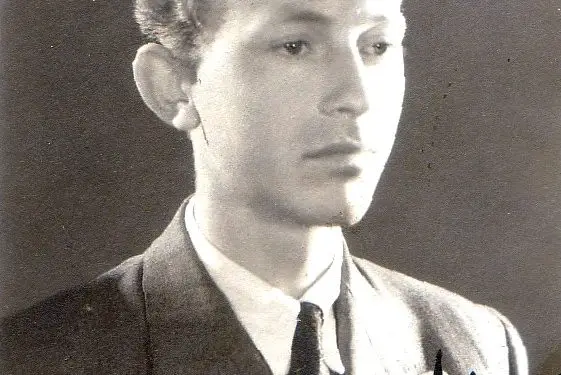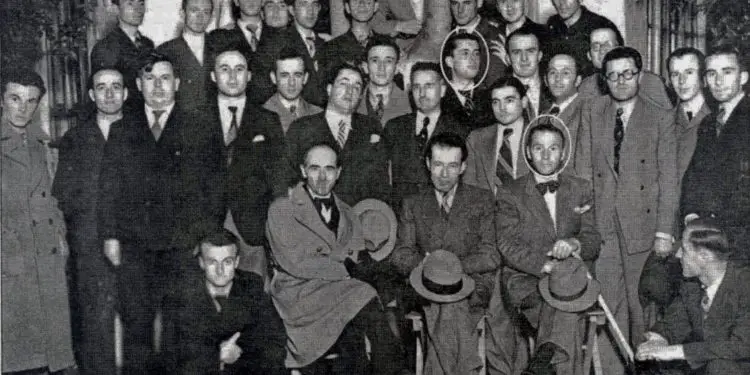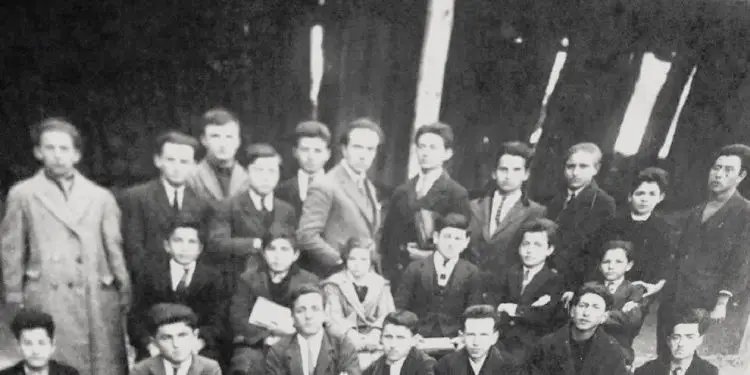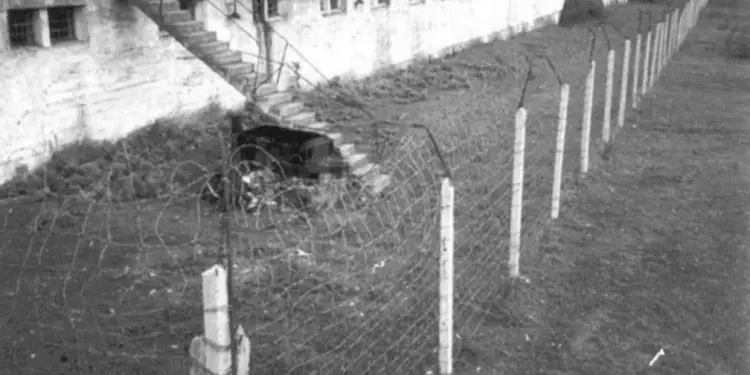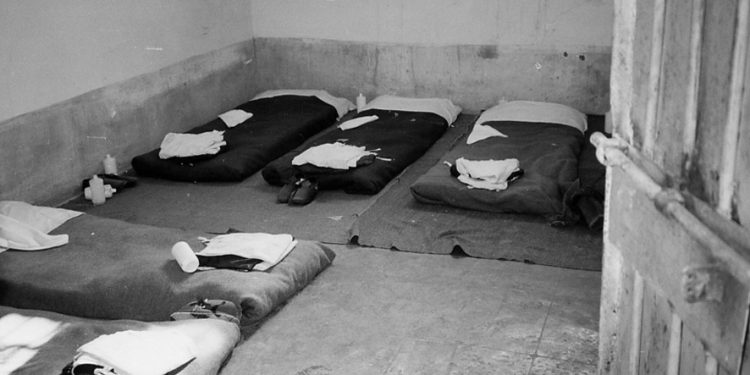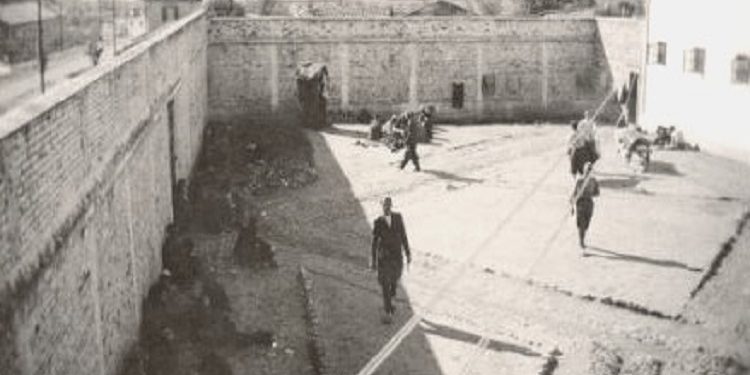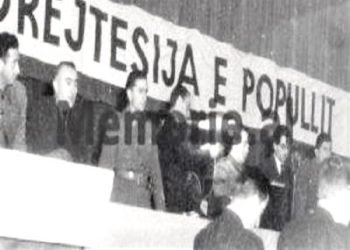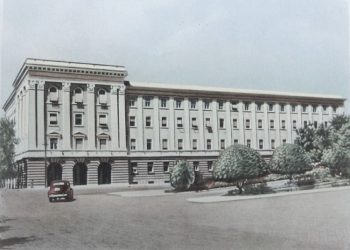By Uran Kalakulla
Part thirty-five
Nazism and communism
Memorie.al / Nazism lasted 12 years, while Stalinism 2 times longer. In addition to many common characteristics, there are many differences between them. The hypocrisy and demagogy of Stalinism was of a more subtle nature, which was not based on a program that was openly barbaric, like Hitler’s, but on a socialist, progressive, scientific and popular ideology, in the eyes of the workers; an ideology that was like a convenient and comfortable curtain to lie to the working class, to lull the sharpness of intellectuals and rivals in the struggle for power.
One of the consequences of this peculiarity of Stalinism is that the entire Soviet people, its best, capable, hardworking and honest representatives, suffered the most terrible blow. At least 10-15 million Soviets lost their lives in the torture chambers of the KGB, martyred or executed, as well as in the gulag camps and others like them, camps where it was forbidden to correspond (in fact, they were prototypes of the Nazi death camps); in the mines in the ice of Norilsk and Vorkuta, where people died from cold, hunger, from crushing labor in countless construction sites, in the exploitation of forests, in the opening of canals and during transportation in leaded wagons, or in the flooded barns of the death ships.
Continued from the previous issue
To be honest, I asked him this question on purpose because I knew he would start some story related to the dictator. At that time, I collected as much material as I could in prison from those who had personally known the dictator at different times and periods, directly or through a third person.
And I wrote it all down in a cryptogram notebook, that is, with an alphabet that I had invented myself, which gave the impression, on the outside, that it was an Albanian dictionary, for the rare words of our language, but in reality there was what one or the other had told me about the dictator. Because I had decided to write a monograph about this tragicomic character of our unfortunate history. And if I still had life, I would undoubtedly write it.
Thus, Goni told me explicitly how Enver Hoxha, when he was a student at the lyceum, took Zog’s dollars as a bribe from a butcher named Kia. When he was a “professor”, years later, at that same lyceum, he stole the shirts of the French director of the lyceum from the window; how honest and serious people despised him; how he would go around a girl named Galata, daughter of a noble family, who was then learning the piano; how he would tell her fairy tales and adventures in the pastry shop, with the women members of the ‘Communist Group’ of Koço Tashko and Koci Bako, eating her pastries by the glass, almost every day.
And full of such things. In this respect, Goni was a real mine. But also in many other aspects of life. The only thing was to make her talk and talk. And I had learned this “craft” very well, but without losing for a moment the friendly love and respect she deserved for her. Sadly, when I came out of prison and exile, he was no more, having died in misery, at least in the bosom of his honorable family, but I am sure with an unquenchable resentment in his soul that he did not get to see with his own eyes the shameful collapse of the Enver dictatorship.
In the Elbasan prison camp, I also met Fehmi Beshiri. About two or three years ago, I published a portrait of him in the newspaper “Liria”. I had a good friend Fehmi, I loved him and he loved me, I even ate bread with him, as long as we were together, until they took me and took me to Burrel and I left him there, because he wanted something like a month to be released.
Fehmi was a wonderful man and it was not only me who loved and appreciated him, but the whole camp loved him: young and old, good and bad. Because Fehmi was one of those people who never know how to become enemies with others, especially with their fellow sufferers.
He was a short man, over sixty, when I must have been almost half his age. But this age difference did not prevent us from becoming good friends at all. And today, among his fellow sufferers, especially the younger ones, there are many who remember him with love and respect.
With his large brick head, his missing teeth, his lanky stature and especially his clothing that left much to be desired, he reminded me of Diogenes more than Socrates the Athenian, but not for his skepticism, but because Femius was very close to Epicureanism, where he often mixed the thirst for knowledge with hedonism, being himself, as a lifelong bachelor, a tireless admirer of feminine beauty and an unyielding lover of this beauty.
In this respect, he had something in common with Goni Treska, but with the specific differences of each. But Fehmiu, like Goni, was a staunch enemy of communism, an admirer of Western democracy, and his heart wept bitterly for the misfortune of our people and nation, having a strong sense of citizenship and patriotism. And this was based not only on the tradition of his family, but also on the culture he had.
Because Fehmiu had completed a classical gymnasium at a private college in Rome and still remembered verses by Horace, Ovid, and Virgil, by heart, in the original, that is, in Latin, as well as those by Homer, Hesiod, Pindar, Anacreon, and especially Sappho (I believe it is clear why), in ancient Greek. So, he had not studied literature and classical studies at the university in Vienna, but had enrolled in the faculty of medicine, but was unable to finish it, because as an Epicurean who was also a hardened hedonist, he had more frequently visited beautiful Viennese women and the famous clubs of the Austrian capital than the medical halls.
Fehmiu also knew Italian, English and German very well at that time. He was even the one who strongly encouraged me to start learning the latter language. But, being somewhat conservative, he did not accept any official or literary version of Albanian and continued to speak simply in his original Tirana dialect. And more or less I also spoke in his version to him, because I was also born and raised in Tirana and call myself a Tirana, regardless of my parental origin.
Looking with contempt at the spiritual misery and meanness of some of his fellow sufferers, he, indignant at their vulgar behavior, because in his soul he remained a true gentleman, called some not by their names, but by the nickname “Albanian”. But gradually he attached this nickname to everyone, even to the point that others began to call him “Albanian”.
In this way, this kind of “own goal” remained at his own door. Even to the point that today, almost among our friends, when we remember Fehmi, we remember the nickname “Albanian” before his real name. But, with a fundamental difference, that Fehmi was not one of those “Albanians” that he stigmatized, but was a true Albanian, noble and patriotic, a gentleman in spirit and honest, that is, an Albanian with capital letters.
Unfortunately, when he died, I could not go to the funeral, because I was in exile with my whole family. And so we never saw each other again in this life. In Burrel prison, I met, in addition to other elders, Engjëll Çoba, from the best and noblest families of Shkodra. He was a short man, who had long since passed seventy. He served no less than 23 years in prison, most of which he had spent in Burrel prison.
Engjëll had completed almost all of his education, from high school to university, in Italy, let me be clear, in Rome, and in every school category he had distinguished himself as one of the best. Thus, he had received a perfect cultural formation, especially in the humanities. Although his specialty was law, he knew literature, economics, philosophy and sociology. As an excellent connoisseur of Italian, he also knew Albanian and even Tosk very well, in addition to his native dialect. He also knew French and English.
And even though he was already in his old age, burdened by long years in prison, his passion for knowledge and thirst for reading had not abandoned him at all. Or did he not have a wonderful, almost boyish memory! Thus, he remembered entire passages from books he had read, as well as conversations with famous historical and political figures of the pre-communist era. The only person, during my entire prison sentence, to whom I told him, in detail, the history of the political group for which I had been convicted, was him.
And even though there were some differences in our political views and worldview, he still understood me very well and even approved of my action. It was a real pleasure to talk to him. There was a real elegance in his speech, as if you were reading a book of selected dialogues. The exposition of his thoughts or of a certain thesis was not only done with an elegance of style in speech, but there was in it a remarkable depth of thought and a very rich and accurate vocabulary, which wonderfully suited the argument in question. Or was there not also a very subtle humor, where humor easily found a way to explode with all its entertaining delight.
Engjelli had previously practiced his profession as a lawyer, as soon as he had returned from university studies in the Homeland. Later he had held high state positions. Thus, during the Italian occupation, he had worked as secretary general in the Prime Minister’s office, in Mustafa Kruja’s cabinet. While in the government of the Supreme Council (September 1943, November ’44), he had worked as deputy minister of Internal Affairs. A very delicate task in a very delicate time, his! Well, he was a pure patriot. But, wasn’t this job a great, irreconcilable contradiction?
He had a great regard for Mustafa Kruja, both for his political views and for his cultural formation. And in some cases, he even had adoration. But these considerations did not seem to fill my mind very much. And then I had a somewhat strong discussion with him. I accepted Mustafa Kruja’s culture, even linguistic in the field of Albanian, as well as his political position between the years ’20-24, but I did not want to hear at all about the time of his political emigration, when he had openly expressed his pro-Italian views. Why, did Mustafa Kruja not know the appetite of Italian imperialism towards Albania? Did he not know the Florence Protocol, as well as the Tittoni-Venizellos Pact? And then?
I appreciated Mustafa Kruja’s initiative to establish the first Institute of Albanian Studies, where, among other things, the preservation of the purity of the Albanian language and its purification from many barbarisms were greatly promoted. But politically, was his (Mustafa’s) stance as prime minister under fascism, and not being, as Engjëlli said, a fascist at all? Then how could he, the son of a patriotic Shkodra family, have agreed to cooperate in such a government cabinet, which then, willy-nilly, had acquired the nickname of a quisling government, a term very useful at that critical time?
From my replies, Engjelli did not break the silence at all and then he began his explanation, which has remained in my mind: – “Like me and many others who participated in that government, as well as in the later government of Rexhep Mitrovica or Maliq Bushati, we started from the principle that the Italians say with the well-known expression: ‘Salvare il salvabile’ (save what can be saved). By leaving the government entirely to the Italians, they would make the law in our country and the Italianization of Albania would be done in quick steps.
So, we entered the government to hinder this denationalization process as much as possible. And this was the same thing during the German occupation, not because the Germans wanted the Germanization of the country, because you know why they came to Albania, but to minimize, as much as possible, their repressions against the armed resistance of the various political forces of the time, who wanted the liberation of the country from them as soon as possible foreigners.
Thus, when Albania was liberated from the occupiers, thanks to the war of the great anti-fascist powers and if a democratic government like those of the West were to be established in our country after the war, my friends and I were ready to appear in the free court of democracy, to give an account, just as Petain did in France and, accepting any sentence that could be given to us, up to life, as happened to Laval, who was shot by the French. So, it was a conscious self-sacrifice of ours”!
His explanation made me think. It was a sincere and serious explanation and ready to fill your mind. When the other agrees to put himself in the dock, before a fair Albanian court, what more could I say to him? Even if his thesis were not entirely accurate, it would create a natural respect for this man, both for his sincerity and for his manhood.
And the Angel continued: – “I could have escaped like the others who fled Shkodra, from Mit’hat Frashëri to Bazi i Canës, although neither one nor the other had collaborated with the occupier at all. Why couldn’t I have escaped with them, since I was in Shkodra at that time? To tell the truth, I then, like many others, thought that the English would come and then the establishment of a true democratic government would be possible. But unfortunately this did not happen, I remained hidden for two years and in ’46, finally, when I had given up all hope, I came out of hiding and surrendered. They sentenced me to death and spared my life.
And now, after 23 years, I am still in prison. I am, therefore, aware of why I am here and the prison, despite all the difficulties and great dangers that we have gone through together with the others, I have endured with the greatest calm. But even if I get out of here, since my release is approaching, I know what kind of life awaits me. But at least I die in my home, if they leave me, in the bosom of my family. That’s how my fate was”!
After this conversation I was silent. He had said in his last words, an undeniable truth, although very bitter. Engjëll Çoba was one of the old prisoners, who had “inaugurated” the Burrel prison and had lived through all the horrors of that prison. And there he had met and befriended all the personalities and intellectuals of that time, who had been the cream of Albanian culture. And he knew how to denounce everyone, everything. He was an encyclopedia in this regard. But even when the prison gradually began to change in terms of content, he had remained an example of behavior and seriousness.
And the entire prison honored him to the fullest. His wise, measured and serious behavior had even forced the command to respect him, because even the enemy, when considering the figure of such a man, is obliged to be measured and even respect him. We accompanied Angel when he finally left prison, with love and respect. And since then, in that prison, I have not found another person to fill, even half of the void that he left me.
He returned to his halved family, like many others, and after some time he died alone from hepatitis cirrhosis. So I was still in prison at the time and we never saw each other again. But, when I published my book of poems, one of them, with the title; “The Death of the Swallow”, I dedicated it to his memory, because the subject of that poem had many things in common with his life and fate.
The “University” of the Prison
By locking you up in prison, if not executing you immediately, with a bullet, a rope or even through extreme torture in the interrogator’s office, the dictatorship aimed to eliminate you in two ways. Its goal was to bring you slow death, to bring it closer every day, through: hunger, cold, unbearable heat, the cramped, humid place where you were confined (without enough air, without light, without clothing) and, when the occasion arose, to take you to the camp through extreme physical exploitation. / Memorie.al




